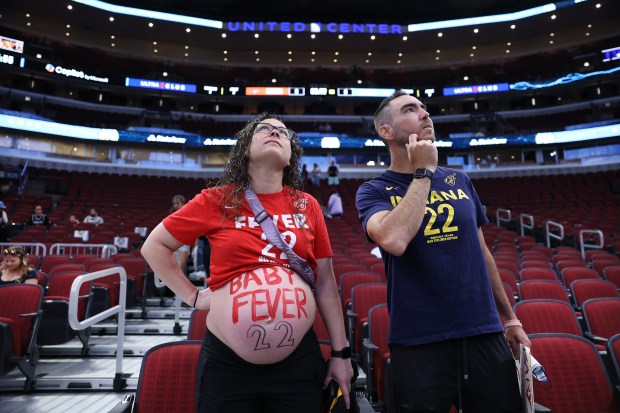Rabbi Neil Brief served at Ezra-Habonim, the Niles Township Jewish Congregation in Skokie, for 33 years and developed a reputation for building bridges with other faiths.
“He was incredibly welcoming, compassionate and kind, and he was non-judgmental, which is very important in a rabbi,” said Cook County Judge Shelley Sutker-Dermer, the congregation’s president. “He had such pride in being part of our congregation. He was just a mensch.”
Brief, 89, died Jan. 27 at the Carrington at Lincolnwood assisted living community in Lincolnwood, said Rabbi Jeffrey Weill of Ezra-Habonim, the Niles Township Jewish Congregation. Brief was a longtime Skokie resident.
Born and raised in Brooklyn, New York, Brief began rabbinical school in New York in 1955 and attended New York University and Hebrew Union College-Jewish Institute of Religion before serving in the Army for two years as a chaplain at an Army base in Arizona. One of Brief’s rabbinical school classmates, A. James Rudin, would go on to become inter-religious director for the American Jewish Committee.
“He was the kid from Brooklyn — ebullient, joyful, playful and very smart, and we became rabbis together in 1960,” Rudin recalled. “He was very knowledgeable about Judaism but he had this wonderful quality of reaching out to anybody and everybody.”
Brief served for 11 years at synagogues in Arizona and California. In 1971, he was hired to lead what then was known as Niles Township Jewish Congregation. The synagogue later merged with another synagogue and added the name Ezra-Habonim.
“There was a real comfort level here,” Brief told the Tribune in a 2016 interview, reflecting on his family’s reception in Skokie. “We grew very comfortable in this community. We made friends quickly.”
In a 133-page biography of Brief, written by a family friend, Judith-Rae Ross, and published in 2018, Brief recounted that when asked in 1971 what he had wanted to accomplish in Skokie, he answered, “a rabbi. No more, no less.” That answer became the title of Ross’ book, “Neil Brief: A Rabbi; No More, No less.”
“When speaking on sin and shortcomings, he speaks of forgiveness and redemption,” Ross wrote. “An expert in Gematria (numerology), Rabbi Brief is more likely to give the ‘good word of the day,’ based on its numerical equivalent, rather than a quote from Leviticus.”
In Skokie, Brief was known for spearheading the creation of the Niles Township Clergy Forum, which he later served as president. From that group formed an annual interfaith dinner, held the night before Thanksgiving each year.
Within his congregation, Brief “sought warmth and intimacy with and for this community,” Weill said.
“He liked to connect people and he did so in truly the warmest and most authentic way and with the most authentic, genuine desire to bring folks together,” Weill said. “His rabbinate was based on relationships — that’s what it was about for him.”
Sutker-Dermer recalled Brief’s presence in his congregation members’ “life cycle events,” and she marveled at his ability to remember dates such as birthdays and anniversaries.
“If he spent a life cycle event with you, he didn’t forget it,” she said. “He was a numerologist, and he would talk about the significance of the date.”
Brief also took aim at hatred and division in his community: The fight over a neo-Nazi group’s 1978 attempt to march in Skokie, a predominantly Jewish suburb; the antisemitic graffiti spray-painted on a Holocaust monument in Skokie in 1987; a Ku Klux Klan rally held in 2000 on the steps of the Cook County courthouse in Skokie.
The graffiti appeared one day after Skokie dedicated the Holocaust memorial, and the day after that, Brief was part of a decision to hold a memorial service at the monument to try to understand what had happened. He even suggested leaving the graffiti on the monument, at least for a time, to allow people to think about what had been done.
“This is not the best way to make this place holy, but this place has now become holy ground,” Brief told the Tribune at the time. “As Rabbi (Lewis) Tuchman observed, the very act of its defilement is this memorial’s justification.”
And after the 2000 Klan rally and a counter-rally the following day, Brief told the Tribune, “I almost wish I could have been at that courthouse to say to the KKK, ‘Come in from the cold and stop spewing that dirt.’ Skokie is not a Jew town. It is an American town.”
Both Sutker-Dermer and Rudin highlighted the ways that Brief built and fostered community, both within his congregation and beyond it.
“He set a mark for friendliness and real scholarship at the same time,” Rudin said. “That’s a unique combination.”
Brief retired from his congregation in 2004 but remained active in it until his death, serving as rabbi emeritus.
Brief also was a community volunteer with the Skokie Commission on Family Services, the Rotary Club, the United Way of Skokie Valley and other service organizations.
Brief’s wife of more than 57 years, Erica, died in 2014. He is survived by two daughters, Dena Wald and Debra Hoffen; a son, David; a brother, Seymour; 10 grandchildren; and seven great-grandchildren;
A service was held.
Goldsborough is a freelance reporter.




